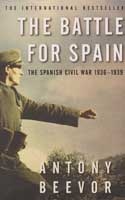When faced with the word "history", I often associate it to ancient ruins and big stone blocks. Coincidentally, books about history also often makes me think of megaliths, and The Battle for Spain is not an exception. This is not the Cliff's Notes version of the Spanish Civil War, but rather a very thoroughly researched chronicle.

The Battle for Spain
Antony Beevor
ISBN: 9780753821657
Phoenix, 2006
English
As good as a history book gets. The encyclopedic information is massive, and skillfully organized and presented. (5/5)
The book is organized chronologically, easing the reader into the war by recapitulating the past eight centuries of Spanish history in a very well written introduction. Beevor explains the political forces that have dominated Spanish society and how they related to each other in a grand sweep that covers a lot of time in a few pages.
History itself is of course not organized, nor does it come with an overview. All that is something that the historian must construct from a sequence of events that at times can be very chaotic. History books can get so bogged down in listing the events that any educating mission the author may have had gets lost in the nerdery. The Battle for Spain sometimes edges very close to losing the narrative in lists of regiments, but is saved by Beevor's summaries and explanations. The introductory chapter is one of the best I've read in a history book. It should be noted that it is when Beevor stops listing known facts and starts talking about the unanswered questions that he is at his very best. The questions he asks are very pointed, frequently challenging at least my views of the war.
Conversely, it is when he lists facts that he is at his worst. For example: There are a number of maps at the start of the book. They all have the provincial capitals marked and named - but the text refers to the name of the province, not the capital. The text talks about Extremadura[a], a province in the south-west, but this name is nowhere to be found on any map included in the book.
Due to the situation in Europe in the 1930's it is impossible to talk about the Spanish Civil War without also discussing how the other great power of Europe influenced and were influenced by the war. Beevor does a good job of explaining how both sides related to the three major blocks in Europe - the Soviet Union, the Axis an the democracies - and above all, how the last of the three didn't understand how much a fascist victory in Spain meant until it was much too late. It is also interesting to read how much Soviet influence affected the strategy of the socialist Spanish Republic, and how the Stalinist paranoia and purges effectively crippled their fighting tactics. Were it not for that, Blitzkrieg tactics might have been first used by the Republic, and not by the Nazis a couple of years later.
Despite the very minor flaws, The Battle for Spain is as good as a history book gets. The encyclopedic information is massive, and skillfully organized and presented. While there are sections that read like reference material, the author does a good job of explaining the big picture to the reader, as well as pointing out what remains unanswered.